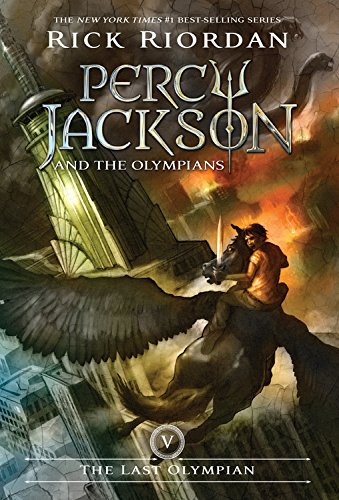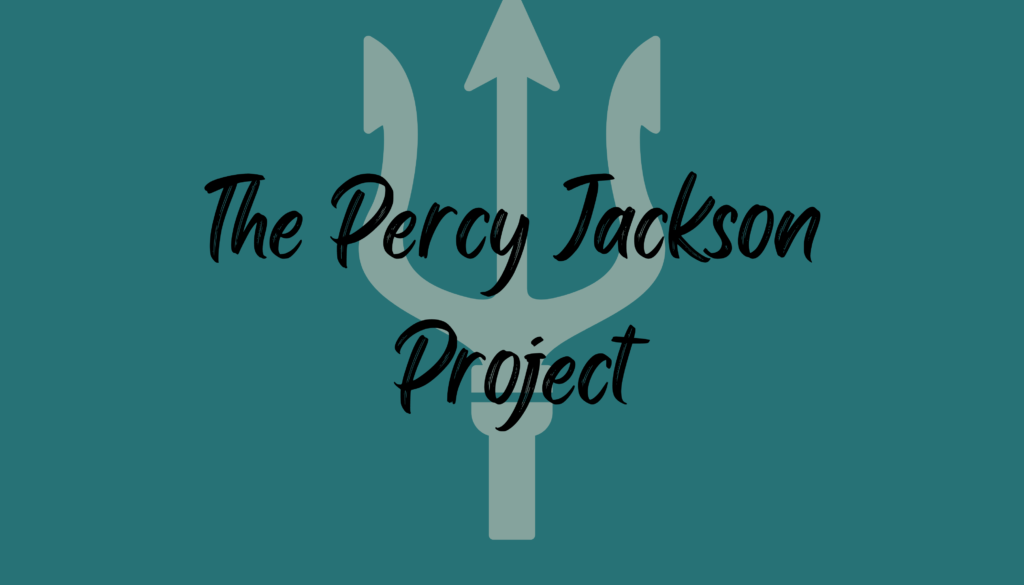Percy Jackson Project: The Last Olympian

So here it is, a long time coming, the final entry into the Percy Jackson Project (of the original five books) covering The Last Olympian. I must apologize, because it has been agonizingly long since I worked on this project. I’ve been overwhelmed with a variety of other projects, including starting two entire podcasts. (Funny story, did you know that this series of blog posts was almost a podcast? I just didn’t have it in me to start one at the time and wanted to start reading right away)
But we’re not here to talk about podcasts, we’re here to talk about why the fact that the resolution to the Percy/Annabeth/Rachel love triangle is the worst and they all deserve better. Honestly, I would love to see them all as a poly triad, but, you know, this is a children’s book published in 2008, so it’s not like I had high expectations in that regard.
In any case, I thought that Rachel’s whole storyline was a little strange to be honest. She so much had her own thing going on that it was like she was in her own book, and we were only getting to see a few pages of it there and there that were being copy pasted into Percy’s.
Firstly, there’s the fact that she was the oracle and the way that her story mirrors that of Luke’s mom seemed a little preachy to me, in terms of over-emphasizing female agency leading to destruction and masculine protectiveness knowing best, and I do not think that Rachel proving that wrong undoes that earlier message with regard to May Castellan or Maria di Angelo.
Sidebar: I also found the fact that Hermes lets May live in a house full of rotten peanut butter sandwiches incredibly disturbing. True, her mental problems are magical so she can’t see a normal therapist but that doesn’t mean that he has to let her live in filth!
There was a lot about women in this book, and in the series as a whole that I struggle with; I think that the way that Maria di Angelo and Bianca di Angelo also reinforce this trope as they are fridged to motivate Hades and Nico respectively. Furthermore, if we think about how Sally Jackson is often put in constant danger as a way of motivating Percy, and Annabeth’s primary role as a hostage in book three, it is a troubling trend. While it is true that Annabeth is a complete badass and was in many ways able to fight for herself, her role in that book was still fridging-adjacent.
Returning to Rachel, so much of what happens to her feels as though it is coming out of left field, and so I find myself confused by it when it happens because she fits into the rest of the story so clumsily. I also struggled with the love triangle between her, Percy, and Annabeth. Firstly, because I do not think that Percy and Rachel have very much chemistry to begin with, at least not to the extent that Percy and Annabeth do. That is perhaps not a fault of Percy and Rachel, but the fact that Rachel is very shoehorned into the narrative and is not given the dedicated time for development that Annabeth is, and so naturally when she is pitted against Annabeth, she falls short. All the same, I do not think that making them enemies was necessary in this way, and in general I find girls who are otherwise written as very intensely practical and skilled, and who would be great friends with one another falling apart over a boy very dull.
At the same time, I did appreciate that we were able to delve into the aspect of Annabeth’s character. Because while I find that Rachel is not as developed as I would have liked, Annabeth is one of our main characters, and is as fleshed out as someone can be without being the protagonist from which we are viewing the story. I think that getting to see the side of Annabeth that is not a warrior but is in fact a vulnerable teenager girl with all that such things entail was important. Realistically Annabeth and Rachel would get into a fight over Percy because teenage girls get into fights over teenage boys all the time, even though I as an adult find it frustrating.
The main reason I say that I find it frustrating is that I don’t like the resolution of the story. I find that the conclusion of Rachel’s arc as the oracle, because we don’t spend time with Rachel, feels forced and like something she was coerced into rather than a choice. Rachel is compelled to become the oracle, and into a life of celibacy despite what earlier in the book is a clearly demonstrated attraction to Percy that has been erased, potentially by this compulsion. The degree to which it is her own feelings that have led her down this path and the degree to which she has been compelled is distressing to me. I see nothing wrong with celibacy, as someone who is asexual it would be entirely hypocritical of me, but the fact that it was potentially not her choice is disturbing to me. I also am upset by the fact that she and Annabeth can instantly reconcile, which proves that competition over Percy was the only thing that was holding back their friendship, as I feel it upholds problematic norms.
Given all these criticisms you may find yourselves thinking that I did not like this book, but I did. I found it to be a satisfying close to Percy’s arc over the past four books with Luke and Kronos, and I am excited to read further books in the series, exploring the meaning of the new prophecy and getting to know new characters alongside further development of characters I already know. I’m particularly excited because I know from others who have read later books that some of the criticisms I have had are corrected as Rick Riordan is known for taking to heart feedback that he receives from fans of his work.
I’m not sure if I will be writing further installments of the Percy Jackson project, and if I do, they will be infrequent and potentially cover multiple books at a time rather than having one reaction post per book.
Cheers,
Talia

The Percy Jackson Project Lives! Thoughts on "The Demigod Files" - Word-for-Sense and Other Stories
September 7, 2022 @ 11:59
[…] The Lightning Thief, The Sea of Monsters, The Titan’s Curse, The Battle of the Labyrinth, and The Last Olympian, I’ll be starting next week with my thoughts on The Lost Hero, the first book in The Heroes of […]